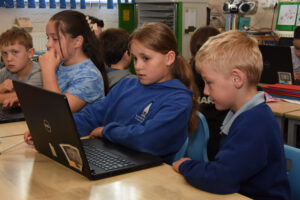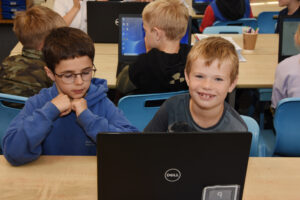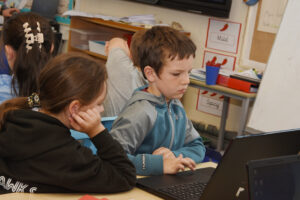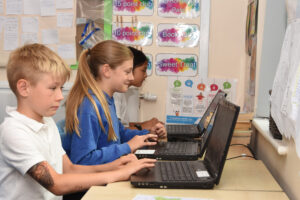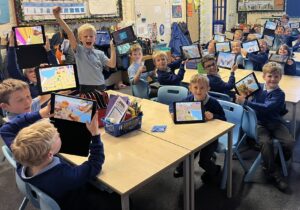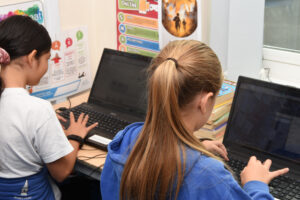Curriculum Intent
Our intent in Computing is to ensure all pupils are taught the knowledge, skills and vocabulary appropriate to their year group focusing on the key end points.
Curriculum statement
Through the study of computing, the children at Sound and District Primary School are able to become confident and accomplished in all areas of Computing and technology, developing skills that they will need for the rest of their lives, as we become part of an ever- increasing digital world.
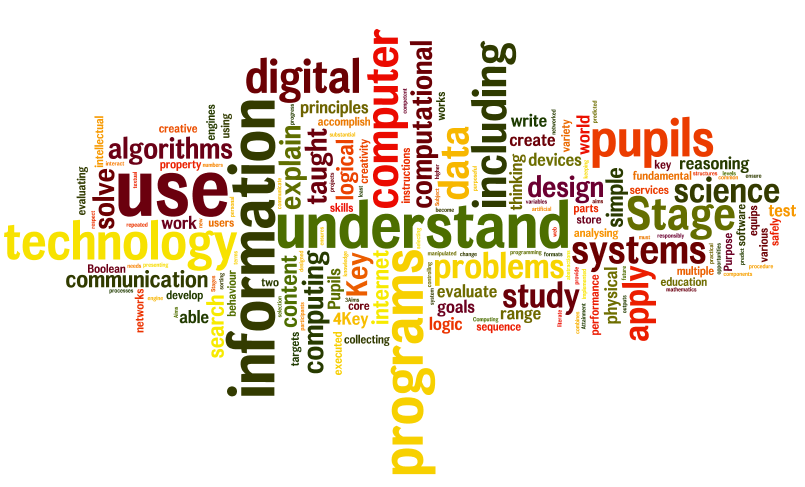
Computing in school
Purpose of study
A high-quality computing education equips pupils to use computational thinking and creativity to understand and change the world. Computing has deep links with mathematics, science and design and technology, and provides insights into both natural and artificial systems. The core of computing is computer science, in which pupils are taught the principles of information and computation, how digital systems work and how to put this knowledge to use through programming. Building on this knowledge and understanding, pupils are equipped to use information technology to create programs, systems and a range of content. Computing also ensures that pupils become digitally literate – able to use, and express themselves and develop their ideas through, information and communication technology – at a level suitable for the future workplace and as active participants in a digital world.
Aims
The national curriculum for computing aims to ensure that all pupils:
- can understand and apply the fundamental principles and concepts of computer science, including abstraction, logic, algorithms and data representation
- can analyse problems in computational terms, and have repeated practical experience of writing computer programs in order to solve such problems
- can evaluate and apply information technology, including new or unfamiliar technologies, analytically to solve problems
- are responsible, competent, confident and creative users of information and communication technology
Subject content
Key stage 1
Pupils should be taught to:
- understand what algorithms are, how they are implemented as programs on digital devices, and that programs execute by following precise and unambiguous instructions
- create and debug simple programs
- use logical reasoning to predict the behaviour of simple programs
- use technology purposefully to create, organise, store, manipulate and retrieve digital content
- recognise common uses of information technology beyond school
- use technology safely and respectfully, keeping personal information private; identify where to go for help and support when they have concerns about content or contact on the internet or other online technologies
Key stage 2
Pupils should be taught to:
- design, write and debug programs that accomplish specific goals, including controlling or simulating physical systems; solve problems by decomposing them into smaller parts
- use sequence, selection, and repetition in programs; work with variables and various forms of input and output
- use logical reasoning to explain how some simple algorithms work and to detect and correct errors in algorithms and programs
- understand computer networks, including the internet; how they can provide multiple services, such as the World Wide Web, and the opportunities they offer for communication and collaboration
- use search technologies effectively, appreciate how results are selected and ranked, and be discerning in evaluating digital content
- select, use and combine a variety of software (including internet services) on a range of digital devices to design and create a range of programs, systems and content that accomplish given goals, including collecting, analysing, evaluating and presenting data and information
- use technology safely, respectfully and responsibly; recognise acceptable/unacceptable behaviour; identify a range of ways to report concerns about content and contact
Computing at Sound and District Primary School
The increasing use of technology in all aspects of society makes positive, creative and productive use of Computing an essential skill for life. At Sound and District Primary School our aim is for children to become confident and accomplished in all areas of Computing and technology.
Computers and other technological aids are used throughout the school. Computing skills are taught as a discrete subject, but then the children are encouraged to apply their skills across all areas of learning and as a means of supporting and enhancing other areas of the curriculum.
Sound and District Primary School is committed to e-safety and so children are taught how to keep themselves safe in cyberspace in age appropriate activities throughout the year.
Check out our new gallery link below to see further enrichment activities and events linked to Computing.

